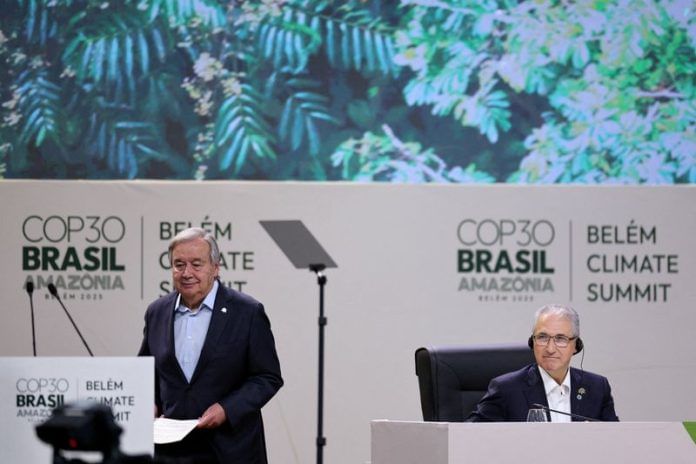By Kate Abnett, Simon Jessop and Lisandra Paraguassu
BELEM, Brazil (Reuters) -An existential question hangs over this year’s COP30 summit in Brazil: what are the annual U.N. climate negotiations really for?
More than 30 years of talks on global action to tackle climate change have led to progress, including surging renewable energy expansion and scaled-up climate funds – but not enough. Emissions keep building. Temperatures are still rising.
That has sparked increasing calls for reform of the Conference of the Parties summits, particularly as the world’s climate negotiations were designed to agree global goals and review their progress, but not to step in to speed up efforts on the ground.
Reuters interviewed more than 30 experts on the subject, including diplomats, former U.N. negotiators, government ministers, activists, investors and development bank executives from both wealthy and developing countries.
Many described the U.N.-led process as needing an upgrade to become fit for the task ahead: turning years of COP pledges into action in the real world.
“We need to turn away from jamborees around negotiations, into really focused efforts to accelerate implementation,” one European negotiator said. “This is probably the last of the old COPs and the beginning of the new.”
But even those that agree the COPs need a revamp disagree on what that should look like.
Those wary of reform say it could not happen at a worse time. With anti-climate politics taking hold in the United States and some others watering down green policies, they fear an overhaul could backfire and lead to something worse.
“In a time in which the climate debate is so vulnerable, to open a reform process could mean that we could be captured by the climate denialists,” former Peru Environment Minister Manuel Pulgar Vidal said.
The U.N. is among those seeking a change. U.N. climate secretariat head Simon Stiell has set up a group of 15 former world leaders, diplomats, ministers, business and Indigenous representatives to advise on how to make COPs fit for the next decade. The group will submit its recommendations in the coming weeks, two members told Reuters.
Stiell told Reuters the COP process had delivered real progress, noting that countries’ latest climate pledges would cut global emissions 12% from 2019 levels by 2035, marking the first steady decline.
“But in this new era, we must evolve and improve in order to accelerate… But we must also be clear about who can change what,” he said.
One member of the advisory group, climate scientist Johan Rockstroem, said “nothing was off the table” as they debated options from allowing majority-vote decisions to restructuring the annual summit’s format.
“In the end, what matters is to start delivering against the agreements,” Rockstroem told Reuters.
CONSENSUS CHALLENGES
For those seeking change, one central frustration is the COP requirement for decisions to be made by full consensus of the nearly 200 countries involved, a model that has often allowed more ambitious efforts to be blocked. A deal at Glasgow’s COP26 in 2021 to “phase out” global coal use was watered down to “phase down” after a last-minute objection from India.
One solution would be to shift to a majority-vote model. But that shift would need a full consensus to happen, underlining that the biggest hurdle to major changes to global climate negotiations is that all countries must approve them.
Some governments have floated ideas like holding the COP every other year, or siphoning off parts into smaller action-focused gatherings, diplomats told Reuters.
Avinash Persaud, special advisor to the Inter-American Development Bank’s president, cautioned against reducing the frequency of summits.
“I fear that if you have a COP every two years, you will lose some of that momentum,” he said.
Tens of thousands of delegates swarming the summits – including big business contingents – have made some recent COPs resemble a trade show more than climate policy negotiations.
While some cheer this approach for connecting governments with the banks and companies needed to make climate pledges happen, others want a downsizing.
“There are people that literally just benefit from going to COP to COP, from cocktail to cocktail, from side event to side event, while the world keeps burning,” said Panama’s COP negotiator Juan Carlos Monterrey.
BIG PROMISES, BROKEN WORDS
A leaked U.N. document seen by Reuters shows an internal U.N. taskforce this year proposed folding the U.N. climate body into another department and asked “whether COP in current form should be discontinued.”
While the proposal is considered unlikely, it was seen by some diplomats as a warning to “get your act together,” one European country’s U.N. climate negotiator told Reuters.
That includes slimming down unwieldy agendas and time spent on technical bureaucracy.
“The system is not working. We are literally drowning in paperwork,” Panama’s Monterrey told Reuters.
Activists also have criticized fossil fuel proponents serving as COP host countries, and urged countries to block summit delegates with conflicts of interest, such as oil company executives seeking to expand fossil fuel use.
Acknowledging frustration over the slow pace of progress, host Brazil has asked COP30 parties to eschew new pledges this year and instead work on how to deliver old promises.
Brazil has proposed creating a U.N.-backed council to visit and check that countries are following through on their COP pledges.
Governments inside the COP30 negotiations are also wrestling with how to evolve global climate diplomacy.
For the first time, countries are considering a final COP deal that would set the intention for the world’s climate diplomacy to “transition from negotiations to implementation”, according to a note published by Brazil’s COP30 president on Sunday.
(Reporting by Kate Abnett, Simon Jessop, Lisandra Paraguassu and Valerie Volcovici; Additional reporting by William James; Editing by Katy Daigle and Nia Williams)
Disclaimer: This report is auto generated from the Reuters news service. ThePrint holds no responsibility for its content.






